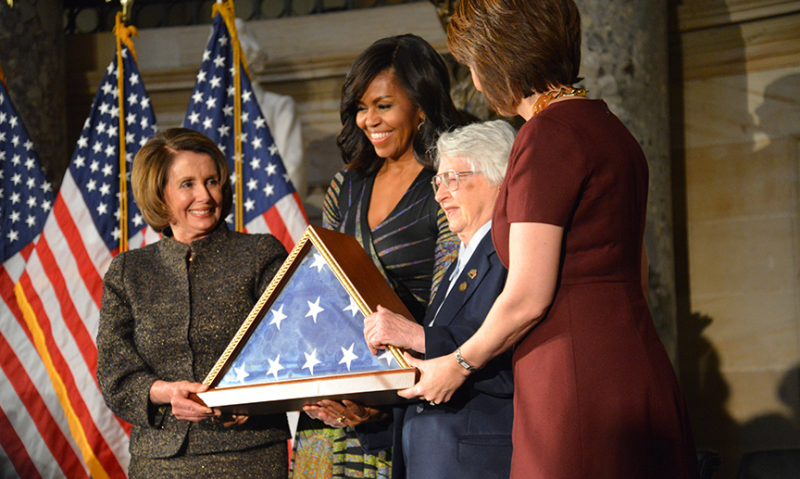
'A very historic time for military women'
 View Photo Gallery
View Photo Gallery
During the month of March, the nation reflected on the contributions of military women from all generations.
In every theater of U.S. operations, women played vital roles. As the fastest growing demographic in the armed forces, women add significant contributions to the military and their communities following their service.
On March 29, The American Legion honored women veterans' selfless sacrifices and valiant efforts for Women’s History Month.
LaRhanda Holt, American Legion assistant director for women and minority veterans, and other Legion representatives paid tribute to female veterans during a special visit to the Armed Forces Retirement Home in Washington, D.C, and the Women in Military Service for America Memorial. At the memorial, Brig. Gen. (Ret.) Wilma Vaught, president emeritus of the Women in Military Service for America Memorial, spoke to women veterans in attendance about her military journey.
“Let the generations know that women in uniform also guaranteed their freedom," Vaught said, quoting 1st Lt. Anne Brehm, a U.S. Army nurse veteran. "That our resolve was just as great as the brave men who stood among us. And with victory our hearts were just as full and beat just as fast – that the tears fell just as hard for those we left behind.”In 1948, as Vaught completed her senior year of high school, President Harry Truman enacted the Women’s Armed Services Act, granting females the opportunity to serve under permanent military status alongside their male counterparts. Vaught noted that the climate regarding the capacities women can serve in the military has changed considerably, especially since the time she first joined.
Seeking an opportunity to supervise and lead after attaining a degree and working in the corporate world, Vaught was commissioned in the U.S. Air Force. Looking back on an experience she had before she deployed to Vietnam, Vaught recalled the limited amount of training she received, expressing the shock she felt when she learned that she would not have the opportunity to qualify with a weapon. She went home and asked her brother-in-law to teach her how to shoot.
“The closest thing we got to combat training was an exercise where we simulated parachuting out of a plane. That was it," Vaught said. "We didn’t learn anything about combat. We watched films on World War II. When I first learned I would be going to Vietnam, my first question was, ‘Do I need to qualify on a weapon?’ They said, ‘No, and you won’t be taking one.’”
Vaught joked about not even having a uniform when she deployed. “All I had was a pair of slacks made for us to wear during physical training. I wore a seersucker skirt and blouse. That’s what I went to Vietnam in. That’s what I wore my whole time there.”
It just so happened that another woman serving with Vaught was able to acquire an AK-47, a rifle and some ammunition, which she passed down to Vaught before she returned back to the states. As the woman showed the items to Vaught, she convinced her to hang on to them.
“She said, ‘You never know what may happen. You may need these to defend yourself.'" That memory stuck with Vaught. That was just one of the many barriers women in the military faced since they first began volunteering to serve their country.
While in the military, Vaught vigilantly climbed the ranks. She admitted that she was unsure of how far she would go. Although she was the most senior ranking woman in the armed forces when she retired, Vaught said she never imagined she would become a brigadier general.
“I remember at one point, I couldn’t aspire to become a general officer because it was against the law at that time,” Vaught recalled. In 1967, a bill allowing women to be promoted to the rank of brigadier general and above was signed into law.
“It is important to look back to see where we have been, people need to realize the barriers that we overcame and the advancements we made," she said. "We also have to look to the future and what opportunities may lie ahead and what the challenges may be. This is a very historic time for (military) women."Vaught attributed her success and the success of current and future women in the military to the trailblazers from previous eras that paved the way.
As she walked through the women’s memorial, Army veteran Jeanne Beasly, former women’s memorial foundation board member, said it was very nostalgic for her to visit the memorial, and to reflect on her time in the military and the comrades she made along the way.
While at the women’s memorial, Beasly and other female veterans residing at the Armed Forces Retirement Home celebrated each other’s service. They walked through the exhibits together and observed entries, including photos and information, about their time in the service they submitted to the memorial’s data registry as they were shown on a display screen.
“It was a different experience,” said Carol Mulroney, American Legion Department of Maryland county commander for Montgomery County. “This was personal because not everyone gets to live this. What we shared together was an honor and privilege to witness. The women I met really blazed a path forward for us.”
